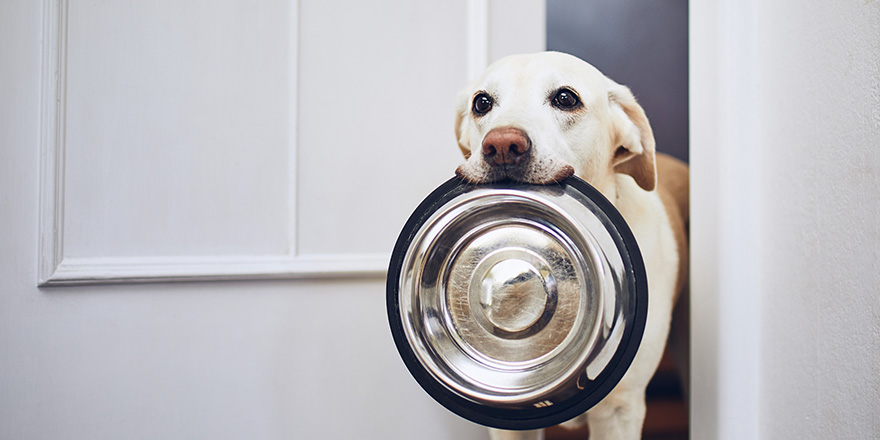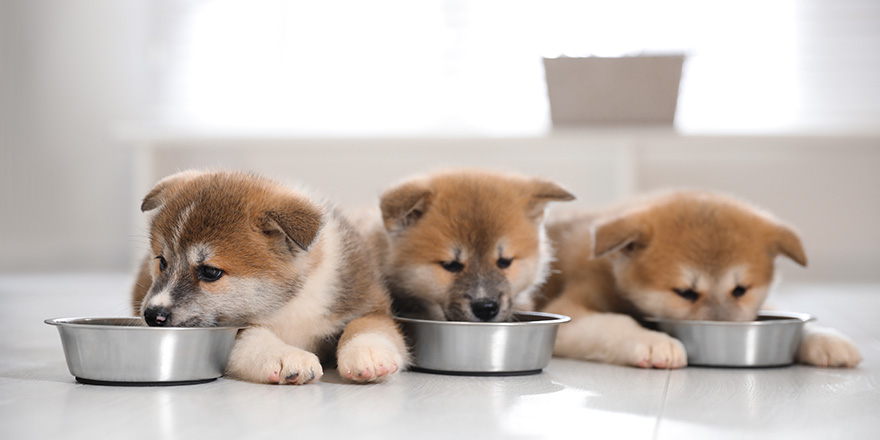Dogs are generally accepting of most fruits and vegetables, hence why they are often found in many dog food recipes. Therefore including some vegetables into your dog’s diet tends to provide additional health benefits in the form of additional nutrition such as natural carbs, vitamins, and minerals. However, there are some fruits and vegetables dogs are not recommended to eat, owing to certain food allergies that are commonly seen in our canine friends. Therefore it’s best to check out whether you can give your dog squash before adding it to their food. So, here we’re going to explore the question, “can dogs eat squash?”

Can Dogs Have Squash?
To go with the simple answer, yes – lots of dogs love butternut squash. However, it is still possible for a dog to react negatively to squash, or maybe even not like it at all! Just like with humans, dogs can be temperamental and picky with their food, so try not to assume they will love it right off the bat. Instead, try a few different ways of preparing it and see which gets their attention most.
Is Butternut Squash Good for Dogs?
Absolutely! In fact, they are highly nutritional in many ways, and so they tend to make a great addition to your dog’s diet, so long as your dog enjoys it of course. Giving squash to your pup alongside their usual food can help strengthen their digestive system and immune system, as well as help to settle upset stomachs and reduce the risk of heart disease.
Nutritional Benefits of Butternut Squash
Taking 205g of cooked butternut squash as an example, this is the type of nutritional information you can expect:
- 82kcal/205g
- 1.8 g of protein
- 0.18 g of fat
- 21.5g of carbohydrate (including 4 g of sugar and 6.6 grams of fiber)
- 84 mg of calcium
- 1.23 mg of iron
- 59 mg of magnesium
- 582 mg of potassium
- 55 mg of phosphorus
- 1144 micrograms of vitamin A
- 31 milligrams of vitamin C
Each of these vitamins provides different health benefits when added to your dogs diet, as explained below:
Vitamin C
Vitamin C reduces the risk of chronic disease, helps to manage high blood pressure, reduces the risk of heart disease, reduces urine acid levels, helps prevent iron deficiency, boosts the immune system, maintains cognitive function.
Vitamin A
Vitamin A protects against loss of night blindness, supports a healthy immune system, supports bone health, promotes growth and reproduction.
Calcium
Calcium is best known for its usefulness in assisting with healthy bone growth and bone strength. This is particularly important with young dogs and puppies that have a lot of development and bone growth to do.
Iron
When a dog eats dog food with a good iron content they receive additional help with immune system strength, gastrointestinal processes, energy levels, and body temperature regulation. In fact, low iron is often characterized by lethargy as the main giveaway.
Carbohydrates
Dog owners often don’t know what types of carbohydrates are appropriate for their dogs. Generally speaking, vegetable-based carbs are a good start. However, certain vegetables such as white potato are relatively low in additional nutritional benefits, so be mindful of this when putting together a complete and balanced diet as carbohydrates are one of the primary sources of energy fuel.
Fat
Pet owners looking to avoid fat should be aware that certain types and amounts of fat are needed in a dog’s diet to give them the much-needed energy to start the day. Too much fat can be the cause of complications such as kidney disease and weight gain. However, letting your dog eat a controlled amount is essential to daily living.
Protein
Protein is the key focus in any dog food, as it is needed for daily function in order to keep your dog fit and strong. Protein can come in multiple forms from vegetables to animal protein and helps with proper muscle growth as well as muscle recovery. This is particularly important for dogs that live an active lifestyle, such as working dogs or competition dogs.
Dietary Fiber
A healthy dog absolutely needs dietary fiber in its food. You need to be sure to feed your dog food with around 2-4% fiber overall in order to ensure they are able to process their food properly. A healthy digestive system means a smooth running body and proper nutrient absorption – without which giving your dog squash as part of its diet will have very little point if they’re not able to digest it properly.
Can Dogs Eat Squash Daily?
Absolutely! In fact, we encourage feeding your dog butternut squash ( or any type of squash really) alongside their day-to-day diet where possible. However, this isn’t true of just squash. There is a variety of fruits and vegetables you can include in their diet to ensure they’re getting that extra nutritional boost.
Can Dogs Eat Raw Butternut Squash?
Raw squash can be a little bit difficult for dogs to digest, and so we wouldn’t advise feeding it to your pooch. Additionally, raw squash doesn’t tend to have as much flavor as cooked squash and can be a choking hazard. So you may find that your dog is less interested in eating it raw anyway.
Is Squash Good for Dogs When Cooked?
It is. In fact, cooked squash is preferred over raw as the texture and flavor are much easier for your dog to enjoy. Pet parents looking for ways to create more healthy food for their beloved pet may find cooked cubes of squash to be excellent both mixed into a good diet for a change of texture and flavor, or even given as an occasional treat (cooked and refrigerated squash makes a great cooling summer treat).
Can Dogs Eat the Seeds?
Yes. Squash seeds are non-toxic and completely edible. Though you should perhaps avoid actively feeding your dog squash seeds as they’re not meant for regular consumption, and excessive amounts could cause constipation and other stomach and digestive irritations.
Can Dogs Eat the Skin of Squash?
Though it is possible for them to eat the skin, we wouldn’t really recommend making a habit of giving it to them unless it has been cooked. Much like with seeds, raw squash skin is tough and somewhat flavorless, and more likely to cause constipation if eaten in large amounts. It can also be a choking hazard as it is difficult to break down owing to that tough texture.
Can Dogs Have Butternut Squash?
Yes! Dogs can eat all types of winter and summer squash. Each one has very similar nutritional value to the next and can equally aid in creating a well-balanced diet for your dog (much like when dogs eat zucchini and sweet potato). Though you may find that one type of squash suits your dog better than another. Additionally, some squash types can have individual health benefits that others may not.
Butternut Squash Types Dogs Can Eat
There is a wide variety of squashes you can choose from depending on the time of year. If you stick with the squash that is in season you’ll get the best flavor out of it. The squashes you could choose from include:
- Butternut Squash
- Yellow Squash
- Acorn Squash
- Delicata Squash
- Pumpkin Squash
- Hubbard Squash
- Kabocha Squash
- Spaghetti Squash
- Field Pumpkin
- Calbaza Squash
- Banana Squash
How Much Squash Can Dogs Eat?
Considering squash is a low-calorie, high-fiber vegetable, dogs can actually eat quite a lot of it as there’s no excessive amount of fat or problematic components. However, it’s not unlimited. Squash makes an excellent treat and can be mixed in with your dog’s food, though we wouldn’t advise giving them copious amounts of it outside of their usual diet as it is rich in vitamin A, which is one of the few vitamins that can cause problems if over-consumed.

How to Cook Squash For Dogs
Generally speaking, you can simply boil squash until it is the desired texture and either mash it before mixing it with your dog’s food or cube it to make little soft bite-sized chunks that can help to add some variation to their meal. However, if you’re wanting to make something a little fancier, you could try something like double-stuffed butternut squash for a real teat once in a while. So as a final note, here’s a simple recipe for a delicious once-a-while treat for your pup! It’s worth noting that this recipe is not suitable for dogs with severe grain allergies due to the use of oatmeal, however, this can be substituted with quinoa flakes:
Ingredients:
- 1 x Butternut Squash
- 1 x Carrot
- 1 x Zucchini
- 2 x Eggs
- 1/2 Cup Oatmeal
- 1 x Celery Rib
- 1 tsp Sage
- 1 tsp Turmeric
- 1 tsp Parsley
Method:
- Preheat the oven to 350º F
- Split the butternut squash down the middle (width-ways).
- Use a spoon, ice cream scoop, or melon baller to create a channel in both halves large enough to fit the zucchini by carving away the seeds and whatever flesh you need to (keep extra flesh to one side).
- HELPFUL HINT: If the squash proves difficult to carve, you can heat it in the microwave for a few minutes to soften the flesh.
- Trim the zucchini to fit inside the squash and cut it in half both width and lengthways so that you are left with four long quarters.
- Carve away the middle of the zucchini quarters until they are able to fit the carrot (keep the flesh to one side).
- Trim and calve the carrot to fit inside the zucchini (wash and keep the peels to one side).
- Any extra space left over with be filled with stuffing.
For the Stuffing
- Dice a celery rib and put the celery rib, zucchini flesh, washed carrot peel, and excess butternut squash flesh into a food processor.
- Add 1/2 cup of oatmeal, 2 eggs, and the herbs and spices to the mix and blitz until smooth.
- Dollop some stuffing into the squash halves, it should squeeze up and around the zucchini as it is pushed in.
- add the zucchini, placing more stuffing into the middle, followed by the carrot.
- Adjust the stuffing as needed for a snug fit and smooth any overfill.
Cooking
- Put the two squash halves back together and truss them up using butcher’s string or skewers in order to keep them together. This can also be done using foil, however, the foil will need to be opened for the final 30 minutes to allow the skin to properly brown and crisp up.
- Place in the oven to bake for 60-90 minutes or until the thermometer reads 165º F in the center (this ensures that the eggs are cooked).
- Allow to fully cool before serving.







